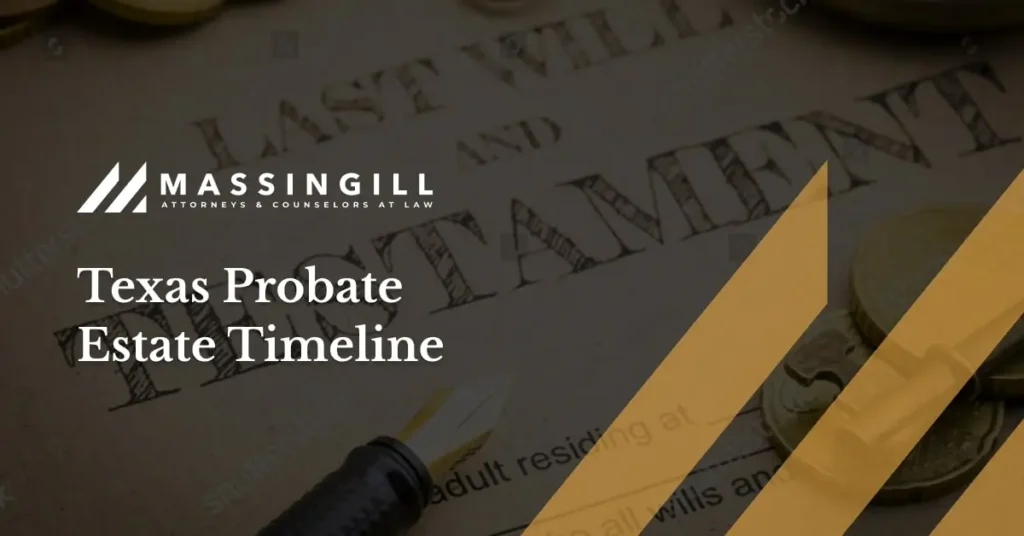
When a person dies in Texas, their estate must be settled and distributed among their heirs.
An estate is just a fancy word for describing all the things that a person owns, including their cash and investments.
When lawyers talk about “probating” an estate, they simply mean settling the estate against any outstanding debts and liabilities.
Whether a person leaves behind a will or estate plan, families want to keep the time an estate is tied up in probate to the absolute minimum. Bills need to be paid. Funeral expenses must be settled.
The length of time it takes to probate an estate is never straightforward and largely depends on whether a deceased person clearly outlined how they wanted their estate managed.
In Texas, courts examine existing legal documents to decide if probate is necessary.
If so, how long it takes to probate an estate in Texas depends on some factors that our Austin estate planning attorneys will discuss in this blog post.
If you have questions, please contact the experienced legal team at Massingill today online or call 512-601-6591.
What Is the Probate Process in Texas?
In Texas, probate involves a specialized court process that officially recognizes the death of a person and oversees the payment of the debts and distribution of assets.
Probate courts attempt to carry out this role while protecting the interests of the beneficiaries and creditors involved.
This process can take between two months to as long as two years, depending on the complexity of the estate.
Some people die suddenly; others have a long time to prepare for their death. That means that people have varying degrees of estate planning in place at the time of their passing.
Even with advance notice of their mortality, people sometimes put off crucial estate planning tasks.
Doing so can complicate the probate process and drag it out longer than needed.
How Long Do I Have to Probate an Estate?
A Will does not convey title, possession, or property interest until admitted to probate. In Texas, a Will must generally be admitted to probate within 4 years of the decedent’s death.
How Much Does an Estate Have to Be Worth to Go to Probate?
Check state laws to determine the minimum estate value for requiring probate, which ranges from $10,000 to $275,000.
Requirements of the Executor of the Estate
Getting the Probate Process Started
Officially, the probate process begins when a person files an Application for Probate of Will and for Issuance of Letters of Testamentary with the probate court clerk.
This person is typically the estate’s executor or a Texas attorney acting on their behalf.
After the application is filed, the court clerk will notify interested parties of the probate of the will and schedule a hearing.
Following the hearing, the judge signs an order, and the executor takes an oath to administer their duties lawfully. Once the oath is taken, the executor receives the power to administer the estate.
Providing Notice to Interested Parties
How long does it take to probate an estate in Texas? Some of that depends on how quickly the executor of the estate provides notice to creditors and beneficiaries.
The executor must give notice to creditors in the newspaper within one month of receiving the letters testamentary.
The executor must also send certified letters to each beneficiary named in the will within 60 days from the date of the probate court’s order.
Estate executors typically find this much easier to do if they have the help of an experienced Texas probate attorney.
Within 90 days of the executor being given the power to begin their job, they must prepare and file a sworn affidavit with the court stating that the notice to beneficiaries was completed.
They must also file an inventory, appraisement, and list of claims with the court within 90 days of the date of admitting the will to probate.
Texas Probate Timeline
Probate timelines can vary significantly. If the estate is small or simple, the probate court can often conclude the process within six months.
However, there are many cases where probate can last for a year or longer. This is especially true where the original will is contested or is missing.
These issues will complicate the process and require more time because the court will become even more involved.
A Texas probate attorney can help this process go smoothly. Probate can be complex and confusing, whether you are the executor of the estate or a beneficiary.
The Massingill team has helped families all over Texas navigate the probate process and can help you too.
How an Austin Probate Lawyer at Massingill Can Help
Probate is complex, but the team at Massingill strives to make the process easy on you.
Our experienced probate lawyers understand you are grieving, and we make every effort to handle probate matters with sensitivity and compassion.
We offer flat fees, so our clients aren’t left guessing what the final bill will be. Contact us online or call us at 512-601-6591 to schedule a consultation via phone, video, or in person.
Where You Can Find Our Austin, Texas Office
Where You Can Find Our Abilene, Texas Office
DO YOU QUALIFY FOR PROBATE?
Fill out our quick questionnaire to determine if you need probate, what type of probate you may need, and estimated fees.



